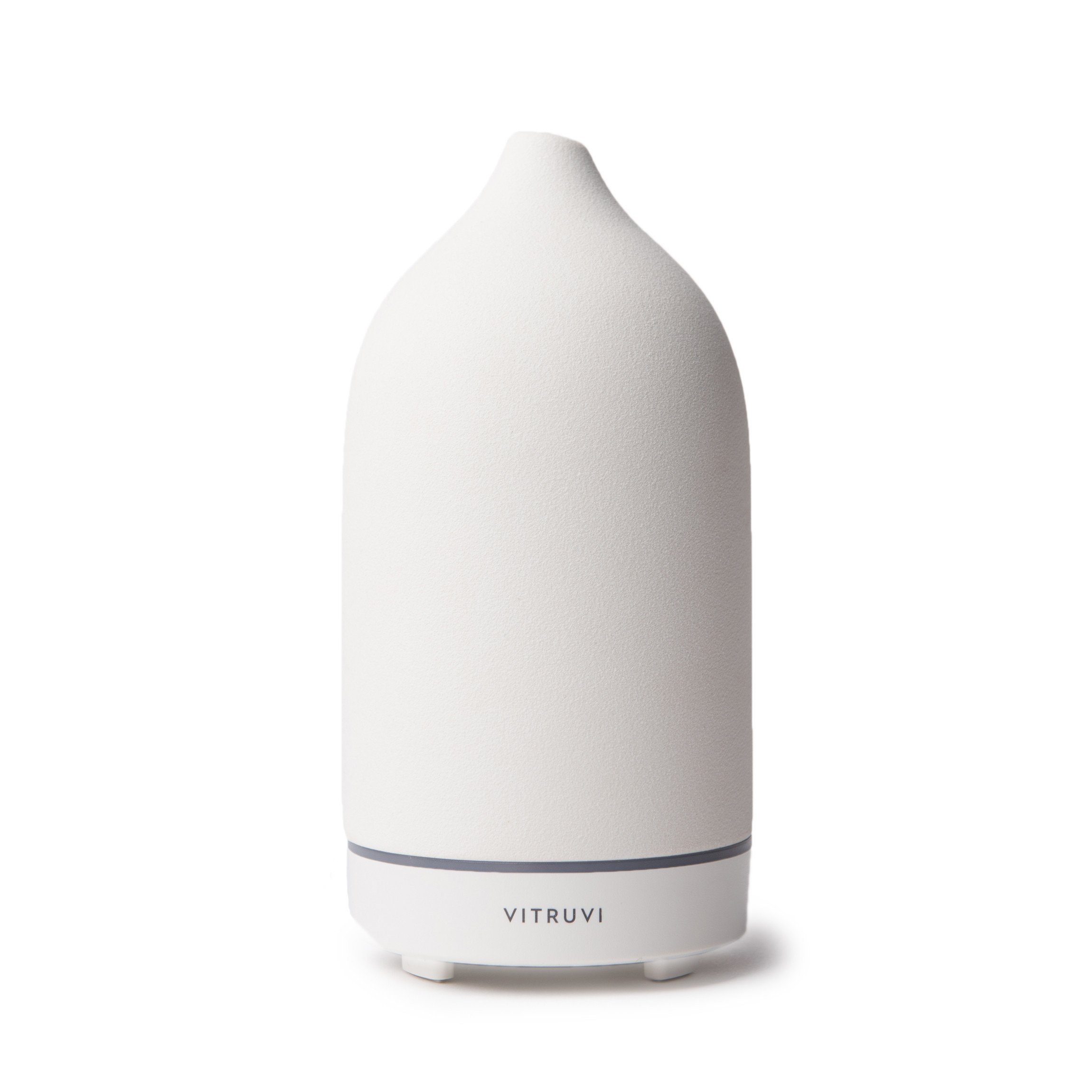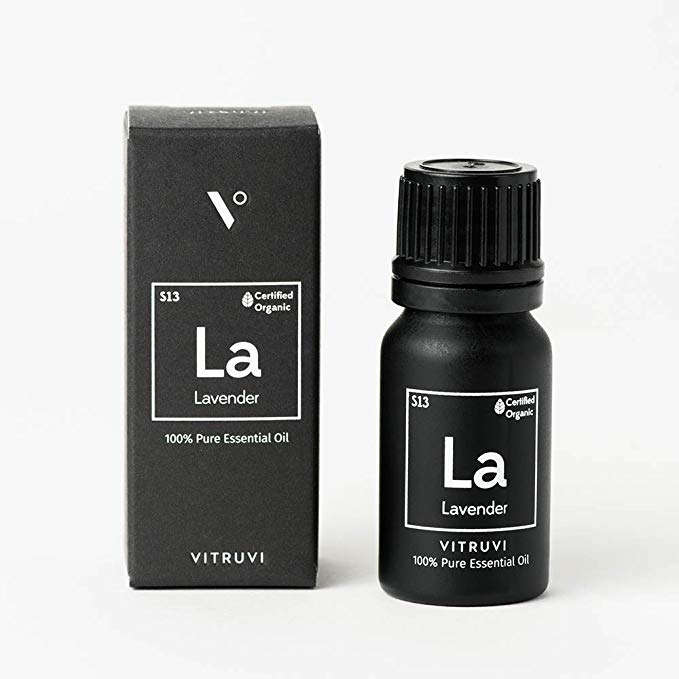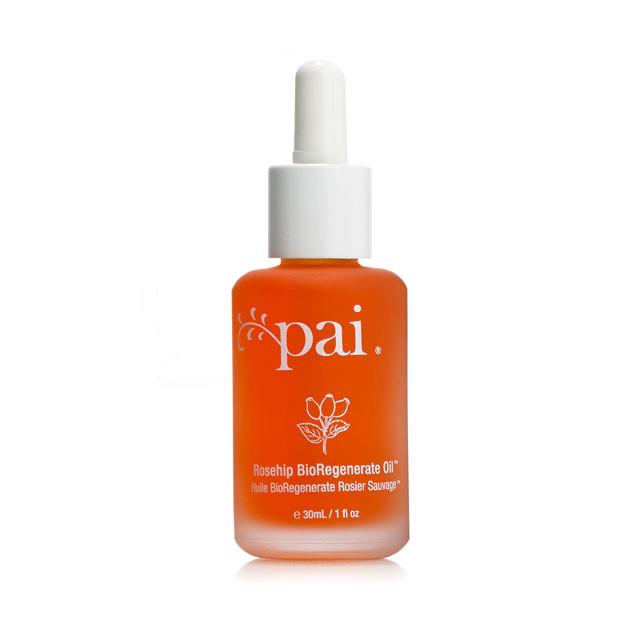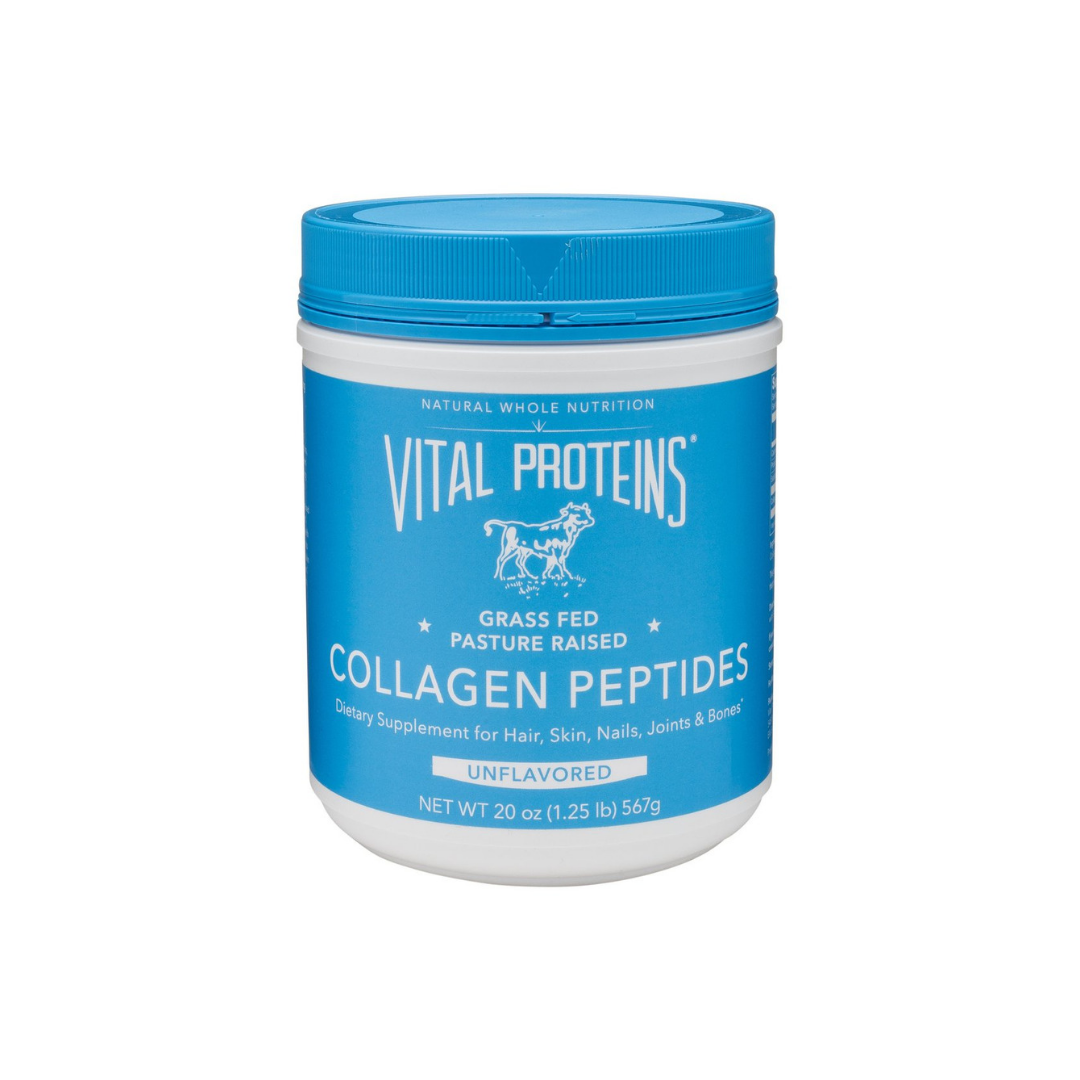Buddha Bowl Recipe for Thyroid Health
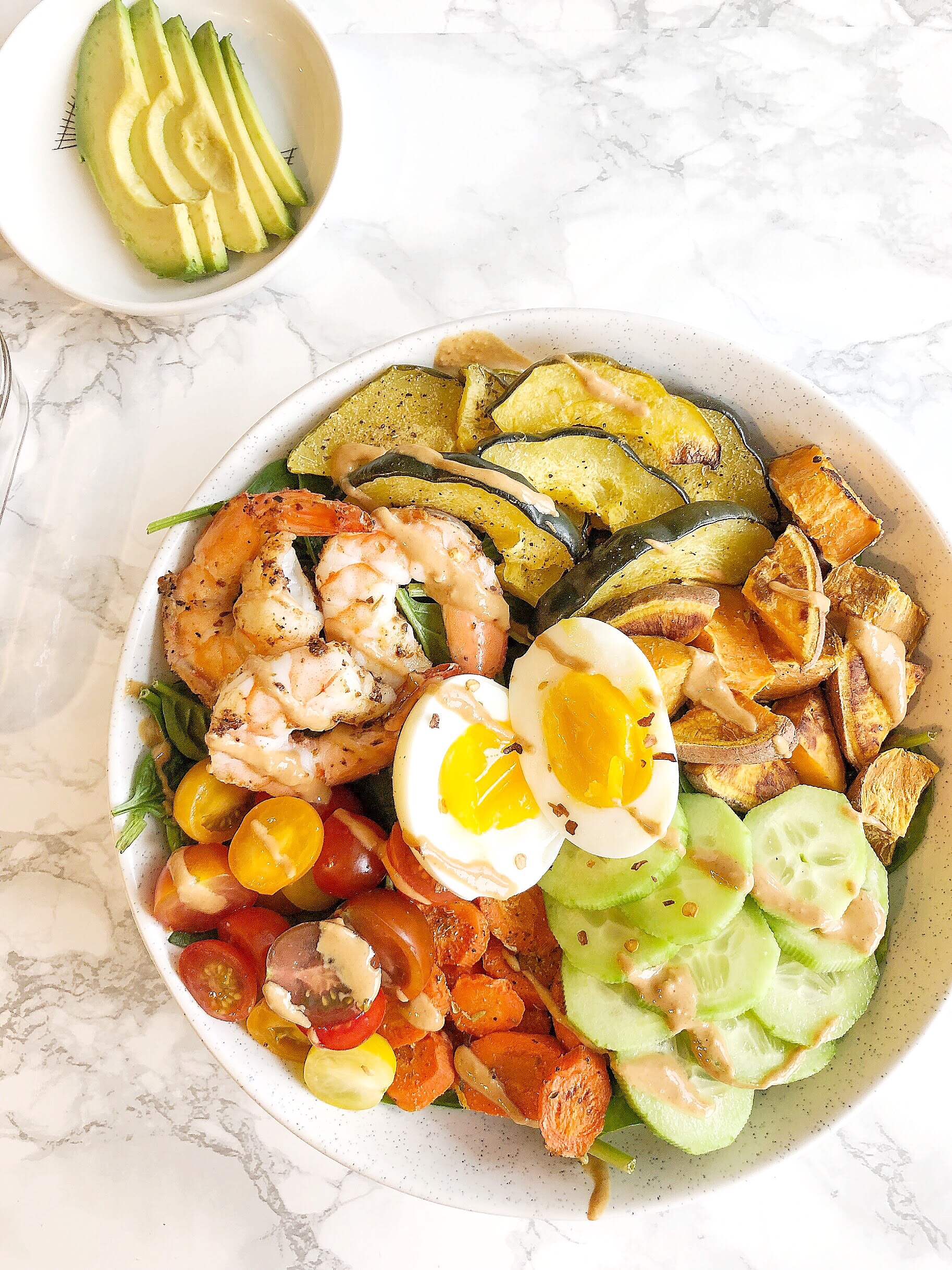
Try this simple and healthy buddha bowl recipe that’s perfect for batch cooking.
Feeling overwhelmed with the idea of batch cooking? I know it can be intimidating, but you don’t have to spend hours cooking extravagant recipes on Sunday night to reap the benefits of batch cooking.
The easiest and fastest way to batch cook is by making a handful of simply-prepared ingredients and throwing them together in bowl or Tupperware (I like these glass options)…also know as buddha bowls. Buddha bowls are hearty dishes that contain a mix of different whole-food ingredients served in a big bowl and topped with a sauce. Traditionally they are vegetarian, but you can make a buddha bowl with pretty much any combination of proteins (legumes, eggs, pasture-raised animal protein, wild-caught seafood), unprocessed carbohydrates (100% whole grains and starchy vegetables), and healthy fats (olive oil, avocado, nuts/seeds and nut/seed butters).
Recommended Reading: Easy Ways to Eat More Vegetables in Every Meal
In honor of Thyroid Awareness Month, this simple batch cooking recipe is especially beneficial for people with thyroid conditions. The thyroid is a tiny, butterfly-shaped gland on the front of your neck. It makes hormones that regulate several critical functions in the body, including growth and development, body temperature, menstrual cycles, sleep, and weight.
When the thyroid is not functioning properly it can produce a variety of negative symptoms, including irritability, muscle weakness, fatigue, weight gain or loss, trouble sleeping, anxiety, depression, irregular periods and many, many more issues. This buddha bowl recipe has several key components that benefit the thyroid, including foods that are rich in selenium and iodine, and foods that help minimize inflammation.
This Thyroid-Happy Buddha Bowl is also great for those who don’t have thyroid issues and just want a straightforward guideline to delicious and healthy batch cooked bowls. This simple and healthy batch cooking recipe gives you the autonomy to choose between ingredients depending on your preferences.
Check out the nutrition facts below for more on important nutrients for thyroid health.
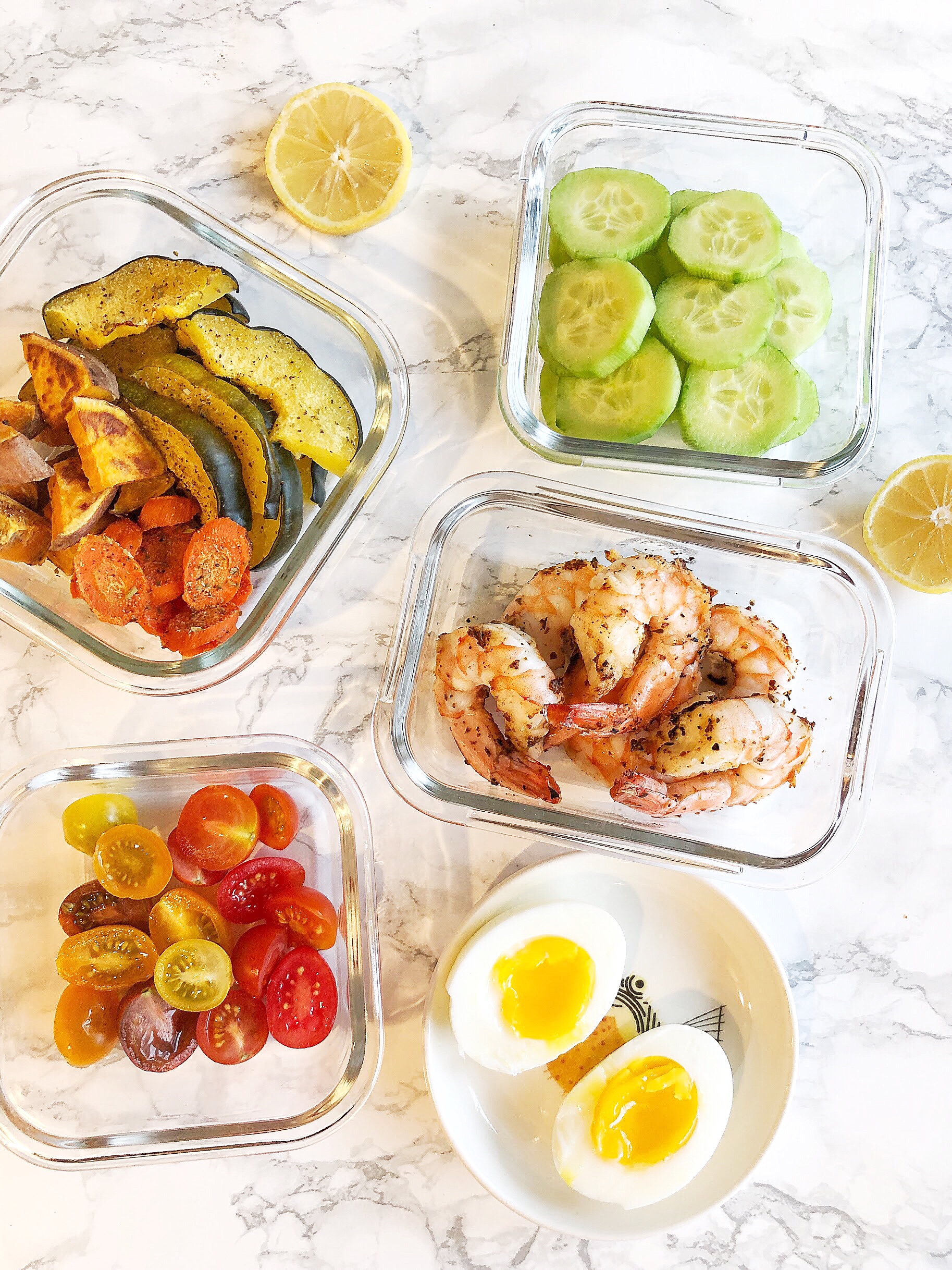
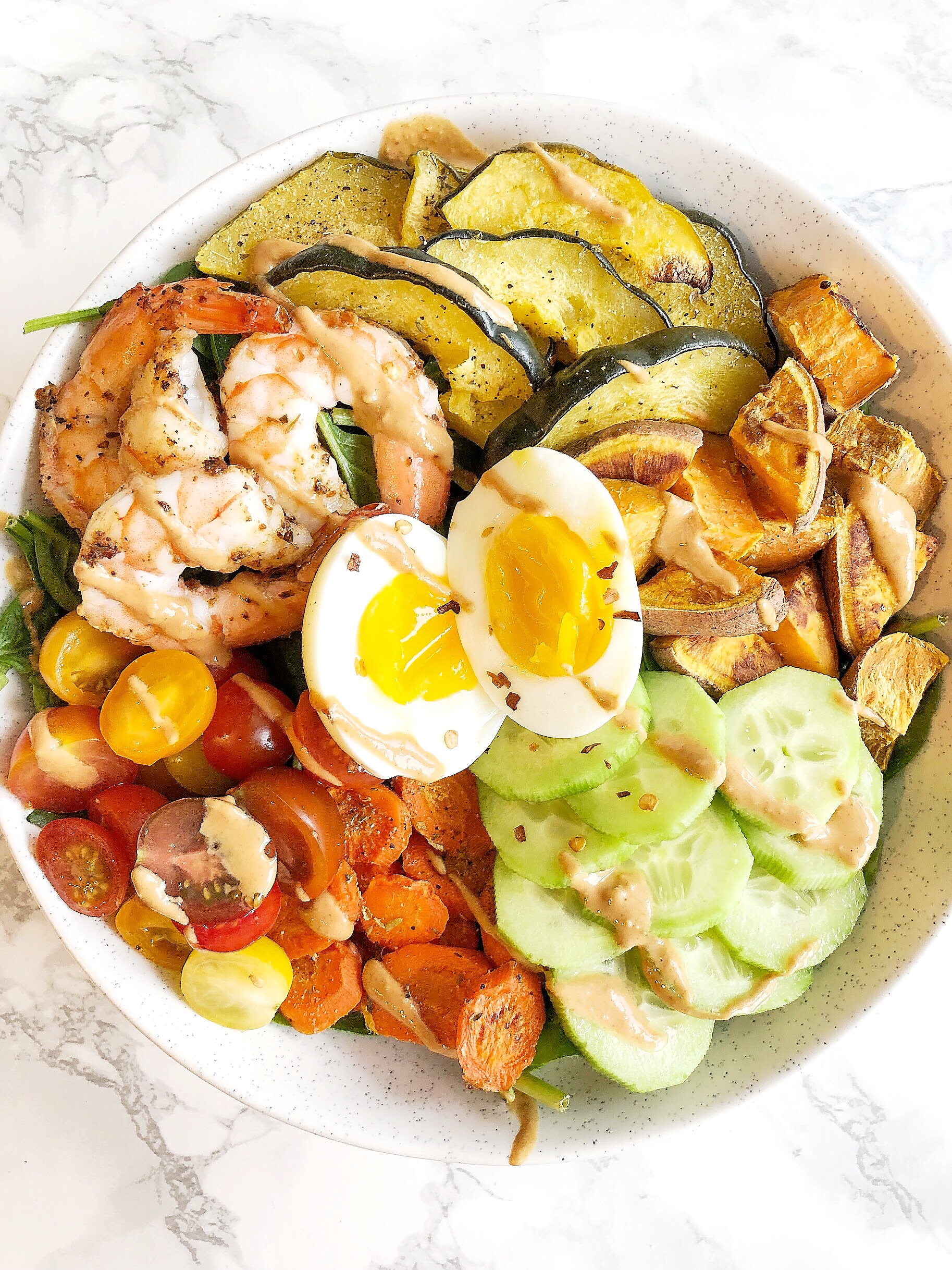
Nutrition Facts
SELENIUM
Selenium is an essential trace mineral that is important for reproduction, thyroid function, DNA production, and antioxidant formation (1). Selenium plays several key roles in thyroid hormone synthesis and metabolism. It also helps to increase antioxidant activity in the body, which is extremely important for people with autoimmune thyroid conditions like Hashimoto's and Graves’ disease.
The best sources of selenium come from Brazil nuts and other animal proteins, such as shrimp, yellowfin tuna, eggs, and liver. One ounce of Brazil nuts (about 6 - 8 nuts) has over 700% of the recommended daily intake of selenium. Three ounces of shrimp has almost 60% of the daily recommended selenium intake, and 1 egg has about 20% of your recommended needs for selenium. This buddha bowl has 55 mcg of selenium, which is the daily RDA for selenium.
IODINE
Iodine is a trace element that plays a key role in thyroid function. It is an essential component of the thyroid hormones thyroxine (T4) and triiodothyronine (T3). Thyroid hormones are essential to supporting metabolic activity, among many other functions in the body (2). It’s important to have a balance of iodine because both iodine deficiency and iodine excess can throw off your thyroid hormones and damage the thyroid gland. Iodine deficiency causes an increase in thyroid stimulating hormone (TSH), which can eventually lead to goiter, an enlargement of the thyroid gland.
Excess iodine can prevent the synthesis of thyroid hormone, which results in some of the same symptoms of iodine deficiency, including goiter, elevated TSH levels, and hypothyroidism.
Because iodine stores need to be delicately balanced, I usually recommend getting your iodine from food sources which have a much lower risk (if at all) for iodine excess compared to supplements. The best all-natural sources of iodine are seaweed (kelp, nori, kombu, and wakame), seafood, and eggs. The shrimp, egg, and kelp noodles in this buddha bowl are great sources of iodine.
LOW-INFLAMMATORY DIET
Hashimoto’s thyroiditis is the most common cause of hypothyroidism in America (3). This autoimmune disease triggers the body’s immune system to attack the thyroid gland resulting in severe inflammation and damage to the tissue. This impairs the production of thyroid hormone, resulting in hypothyroidism.
Eating a low-inflammatory diet is especially important for people with autoimmune thyroid conditions. Food and nutritional status have a big impact on our ability to metabolize and synthesize thyroid hormones, in addition to the functioning of our immune system. Nourishing your thyroid with key nutrients like iodine and selenium can help support your thyroid gland in making thyroid hormones. Minimizing your exposure to inflammatory foods and increasing your intake of anti-inflammatory foods helps to minimize (and in some cases even reverse) the autoimmune response.
Many people with autoimmune disease do best on a Paleo diet, Autoimmune Paleo diet (AIP), or a Modified Paleo diet (Dr. Sarah Ballantyne has an amazing blog with lots of resources for following an AIP diet). If you have an autoimmune disease, try eliminating potentially inflammatory foods like gluten, dairy, grains, legumes, and industrial seed oils. Eat lots of organic vegetables and fruit, grass-fed/pasture-raised/wild-caught animal proteins, and healthy fats (avocado oil, olive oil, grass-fed ghee). The AIP protocol is slightly more restrictive and should be followed under the guidance of a healthcare professional.
This buddha bowl is 100% Paleo and has the added benefit of sweet potatoes, which are a great source of antioxidants to help fight inflammation. Check out the recipe below.
The Recipe
THYROID-HAPPY BUDDHA BOWL
(GF, DF, Vegan & Paleo Friendly)
*Great for batch cooking
Recipe by Gabriella Gavalas
INGREDIENTS
Choice of Protein:
-
Soft/hard boiled free-range organic eggs
-
Wild-caught shrimp
-
Wild Alaskan salmon
-
Wild halibut
-
Free-range organic chicken/turkey breast or tenderloins
-
Grass-fed organic beef
Choice of Carbs/Veggies:
-
1 package of kelp noodles *great source of iodine
-
Organic spinach
-
Organic sweet potato
-
Organic acorn squash
-
Organic delicata squash
-
Beets
-
Carrots
-
Cucumber
-
Organic tomatoes
-
Avocado (slice each time to avoid browning)
Lemon Tahini Dressing:
-
¼ cup tahini
-
2 tablespoons fresh lemon juice
-
1 tablespoon apple cider vinegar
-
2 minced cloves of garlic
-
1 tablespoon 100% pure maple syrup
-
Pinch of salt & pepper
-
¼ cup of water
INSTRUCTIONS
-
Choose your choice of protein and vegetables
-
For batch cooking, make multiple servings of the individual ingredients, and put the extra in glass containers, and store for up to a week. This way it is easy to pick out from a range of ingredients you wants on that day, while also having quick and healthy meals on hand.
-
For the eggs, soft (6 minutes) or hard boil (10-14 minutes), then peel off the shell and store extra in a glass container.
-
For the wild-caught shrimp, salmon, or halibut, grill in a pan using desired seasonings. I like to use smoked paprika, garlic, cilantro, lime juice, and/or Trader Joe’s Chili Lime seasoning.
-
For the free-range organic chicken or turkey, slice breasts or tenderloins into individual serving sizes, season with desired seasoning, then roast at 425 degrees Fahrenheit for roughly 20 minutes or until they reach an internal temperature of 165 degrees Fahrenheit. I like to season with rosemary, thyme, cumin, iodized salt, pepper, garlic, and/or onion powder. You can also grill the chicken/turkey until it reaches that same internal temperature.
-
For the grass-fed organic beef, cut into individual serving sizes, season with desired seasoning, and grill in a pan until it reaches your desired temperature, i.e. rare, medium rare, medium, etc. I like to season with iodized salt, pepper, garlic, smoked paprika, cumin, and or/onion powder.
-
For the kelp noodles, rise under cool running water, then place into a bowl. From here, I like to season them with scallions and nutritional yeast, or simply leave them plain and add the Lemon Tahini Dressing on top.
-
For the organic spinach, I like to layer the bowl with it raw (shown in pictures), or if desired you can steam it and add it on top of the kelp noodles and/or other veggies. If you leave it raw, rinse it the day of, to avoid wilting, and to thus keep it fresh for longer. If cooking, I recommend doing it on the day you plan to eat it to avoid spoilage.
-
For the sweet potatoes, carrots, acorn squash, delicata squash, and beets, chop into medium sized pieces then roast at 375 degrees Fahrenheit for 35-45 minutes. Season with iodized salt, pepper, garlic, parsley, cilantro, and a squeeze of lemon juice, or desired seasoning.
-
For the cucumber and tomato, chop and add on top of the bowl and store extra in glass containers. These two ingredients act as a fresh addition to your buddha bowl.
-
For the Lemon Tahini Dressing, simply pour all ingredients into a small bowl and whisk together until thoroughly combined. This recipe makes multiple servings, so simply store the extra in the refrigerator in an air-tight, glass container.
-
Once the individual ingredients are all prepared, simply choose what you are in the mood for and throw it into a bowl! I recommend adding the raw spinach and/or kelp noodles first, followed by your choice of veggies, and then your choice of protein. Finish it off with sliced avocado and the Lemon Tahini Dressing, and enjoy!
Can’t wait to see you try it! Tag us on Instagram @allgreatnutrition and @healthnutgab.
XO Tamar
Love this recipe? Pin it for later!

AFFILIATE DISCLOSURE
This post contains affiliate links, which means that All Great Nutrition may receive a small percentage of a product or service you purchase using the links in the post. You will pay the same price for all products and services, but your purchase helps support our ongoing work to help others be healthy and happy. Thanks for your support!

Hey! I’m Tamar…

